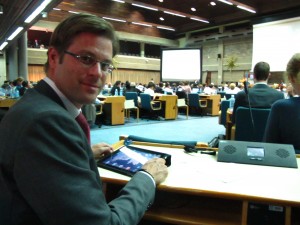“A patchwork quilt also keeps you warm at night” – this was in a nutshell my statement when I attended the workshop of the Council of Europe on Human Rights and Internet Governance at the IGF in Nairobi. The workshop discussed 10 principles on Internet Governance which have been adopted in September by the Council of Ministers of the Council of Europe and asked the obvious questions: How will these principles relate to other Internet policy initiatives around the globe? Is there a need for common global framework – something like a global Internet Constitution?
After the opening statement of Maud de Boer-Buquicchio (Deputy Secretary General of the Council of Europe) a lively debate in true “IGF spirit” evolved. A whole range of stakeholder expressed their views: governments and international organisations, the technical community, business representatives, civil society and academia (one participant even joined via videoconference from China). My take-away was that a majority shared the view that Internet policy principles can and maybe even should develop in decentralised policy-processes on national and regional levels. Yes, that means that we will see overlaps between different initiatives. But that is no problem and just re-affirms that some principles might be regarded as important across the whole globe. And yes, not all sets of principles will look exactly the same: Some might focus stronger on Human Rights and Fundamental freedoms (like e.g. the ones by the Council of Europe), others might also include economic aspects to keep the Internet sustainable (like the ones adopted by the OECD). And both are good sets of principles and have been set up with multi-stakeholder input and in a transparent, open manner. So, one might ask, where is the problem?
I believe such a “patchwork approach” reflects the very nature of the Internet: It has a de-centralised nature and it is therefore just natural that cultural or national differences might exit about some policy principles. One size might not fit all (though in reality experience shows us that the differences are small and limited). Some parts of the world might due to its common culture, values and heritage be able to reach faster consensus about fundamental principles for the Internet, other might move slower or have diverging views on some aspects. However, as long as we will see various sets of principles and rights established, these could together form an efficient (and sufficient) policy framework of principles for a global Internet.
This is exactly the warm patchwork quilt I spoke about. It means that in the end there might not be a need for a uniform, centrally negotiated “Internet Constitution” with global reach.
And this brings us neatly to the next, closely related issue which was hotly debated in Nairobi, in the workshop of the Council of Europe but also in many other of the over 120 workshops and debates at this year´s IGF:
Should Internet Government become governed by a “Central Internet Authority” under the United Nations umbrella?
The so-called IBSA proposal (by the governments of India, Brazil and South Africa) asks for exactly that, a new global body within the UN system to coordinate Internet policies. I tend to agree with some participants in our debate who said that in fact the current system of multi-stakeholder governance in bodies like ICANN and IGF has been able to govern well the fast-changing environment of the Internet. Improvements are necessary, but should focus on areas where issues have become apparent in the past, for example regarding the participation of attendees of developing countries at the global IGF or the exchange of information between national and regional IGFs and the global one.
Such issues will need to be addressed and discussed by the UN CSTD workgroup on improvements to the IGF but certainly do not require a change of the whole current governing system from scratch. As Prof. Kleinwächter, also a member of the UN CSTD workgroup, said rightly in our debate at the IGF: “You will not be able to solve the problems of the 21st century with the instruments of the 20st century.“
This echoes what Kofi Annan (at that time UN General-Secretary) said clearly and visionary already in March 2004:
“In managing, promoting and protecting [the Internet’s] presence in our lives, we need to be no less creative than those who invented it. Clearly, there is a need for governance, but that does not necessarily mean that it has to be done in the traditional way, for something that is so very different.” (cited in MIND CO:LLABORATORY DISCUSSION PAPER SERIES No.1, #2 Internet Policy Making)
Finding innovative, inclusive and multi-stakeholder ways of governance for the Internet is not getting easier when its importance in economic and social terms is growing day by day. But these are the principles and foundations which have made the Internet such a fantastic world-wide success, together with its de-centralised but interconnected nature. We should rather make sure to keep it like that.
What are your views on how the Internet should be governed?
Where do you believe is room for improvement? What needs to be done?
Check EIF’s Feedback from the meeting here.
Christoph Steck, Chief Regulatory Officer, Telefónica Europe.








